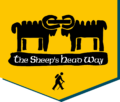Dromnea Bardic School
The ruins consist of a cluster of buildings perched high on the cliffs with another building adjoining a private home. Several other ruins in the location are also considered to be part of the original school. Once an internationally renowned Bardic School, it was founded by the O’Dálaigh’s (O’Daly’s), chief poets to the O’Mahony clan and one of the most famous bardic clans in Ireland. The school was so highly thought of that a King of Spain sent his sons to be educated here. 'Eileen Aroon', said to be the oldest Irish song, is reputed to have been composed by an O’Dálaigh. One of the most famous of the O’Dálaigh poets was Aonghus na nAor (Aonghus of the satires).
There is a fulacht fia near this site that was excavated by R.M. Cleary in 1985, you can read the report here.
Elizabeth Fitzpatrick has written about the Bardic School, and an article by here can be found here.
External Links:
https://www.facebook.com/ODalyBardicSchool/
https://livingthesheepsheadway.com/odaly-bardic-school-project/
In 2016, Muintir Bháire Community Council engaged John Tierney of Eachtra Archaeological Projects to conduct a conservation plan for the remains and site of the O’Daly Bardic School in Dromnea, east of Kilcrohane village. They set about mapping the site of the school, and their work was funded by a Heritage Council grant, awarded to the Muintir Bháire Community Council. You can listen to talks given about the project below.
From the Sheep's Head guidebook:
The group of ruined houses overlooking Dunmanus Bay are part of a bardic school run by the O'Dalys, chief poets ("ollamh" in Irish) to the O'Mahonys. The school flourished here in medieval times (from the 10th century onwards), and legend has it that the King of Spain sent two sons here who accidentally drowned in Farranmanagh Lake.
Robin Flower in "The Tradition" gives a good description of how these bardic schools operated:
"… poetry was an hereditary profession, and the students gathered in some remote place far from the resort of people, and worked in large structure divided up into cubicles each furnished with a bed, lying upon which in complete darkness they composed their poems on themes set by the master. The poem composed, lights were brought and they wrote it down and presented it to the master for criticism in the main place of assembly. For weekends and holidays they were entertained by the gentlemen and rich farmers of the neighbourhood, who also provided the provisions for the subsistence of the school. They worked only from Michaelmas to the first of March and the full course lasted six or seven years….So between November and March the poetic scholars pursued their mysterious task, mastering the poetic language, the management of complicated metres, and the seanchus, the accumulated lore of Irish history and legend."
"Irish glimpses as we get of them (the poets) show them wandering about the country and haunting the courts of kings, attended by a band of followers with a panegyric in one hand and a satire in the other, mercenaries of the God of Poetry as the fianna, the roving warrior bands, were mercenaries of the God of War."
One of the most infamous of the Kilcrohane O'Daly poets was Aonghus who wrote the satire "The Tribes of Ireland". This poem, perhaps commissioned by Carew or Mountjoy, describes the insulting hospitality afforded to the poet on his trip through Ireland. Some of the verses are:
To Roche's country of the clear roads
I came (and that was my mistake)
Just as well for me I don't like butter
For if I did, I didn't get it.
Dunboy of the sour old wines
That the fool's of Ireland praise;
Than that of Dunboy, I bet you,
Hell is a hundred times better.
Three reasons why I skipped
The country of Bantry and Beara,
Soft tasteless lumps of dumpling
Long-divisioned out of milk and water.
Easter I spent in the house of Mac Donough,
A friend indeed, my belt he tightened;
His people and feasts were as mean
As if Easter were another Good Friday.
The old rags of O'Keeffe of Clarach
Are no shelter against the wind,
Although there is a grey head on his shoulders
There is no shortage of lice in his clothing.
Little robin, there on the bush
Though little enough food would do you,
If you spent one night in O'Keeffe's house
Your chest would meet your back.
A large fire in the house of Meagher,
Men and meat beside it;
A large cauldron of fermented winegrapes
Under which is O'Meagher's cow, calving.
A servant of O'Meagher stood up and said that Aonghus should never satirize any Meagher and with that he made a fierce thrust of a knife in the neck of the poet so that Aonghus began to throw up his heart's blood; but before he died he said:
All the false judgements I have passed
Upon the chiefs of Munster I forgive;
The poor servant of the grey Meagher
Has passed this false judgement on me
(Translated by Uilliam O'Dalaigh).
Aonghus was killed in Tipperary in 1617, but his house can still be seen in Cora, two miles west of Kilcrohane.
The Walk then goes past two farmhouses, and on the gable of the western one can be seen a medieval square-headed window that dates from the time of the Bardic School.
